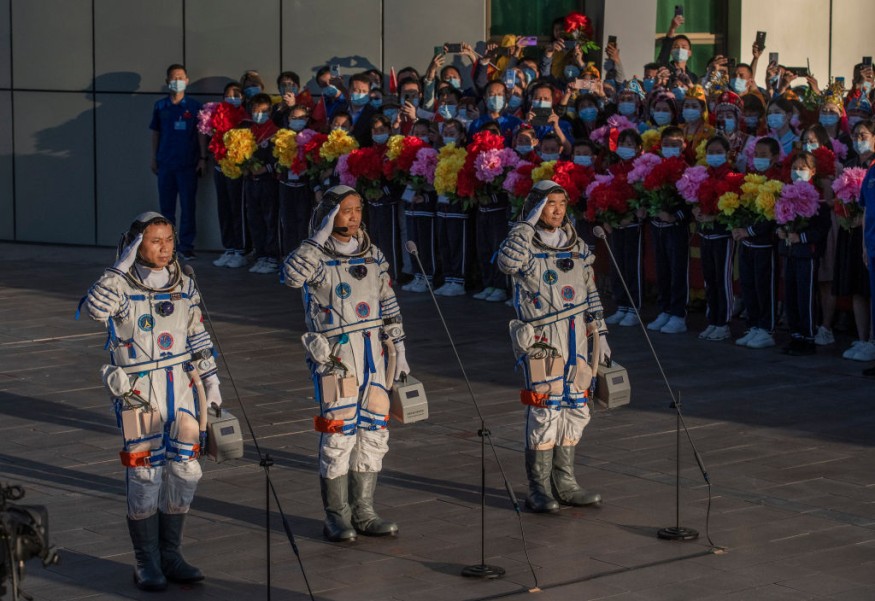China has blasted three astronauts into space on the first of four crewed space trips to complete the country's space station by the end of next year.
A Long March 2F rocket carrying the Shenzhou-12, or "Divine Vessel" launched from the Jiuquan Satellite Launch Center in Gansu province at 9:22 a.m. local time (9:22 p.m. EDT). The rocket is heading for the space station module Tianhe.
Shenzhou-12 is the third of 11 trips that will complete China's first full-fledged space station, four of which will be crewed.
With the launch of Tianhe, the first and largest of three modules, construction began in April.

What Will Chinese Astronauts Do In Space?
For three months, astronauts Nie Haisheng, 56, Liu Boming, 54, and Tang Hongbo, 45, will work and live on Tianhe, the future space station's living quarters.
According to BBC (via Yahoo! News Australia), the major goal of Mr. Nie and his colleagues on the Shenzhou-12 mission is to put the 22.5-tonne Tianhe module into service.
He stated that they must establish their new home in space and test some new technologies. As a result, he stated that the mission is difficult and demanding. Nie feels that if the three of them work closely together and do comprehensive and correct operations, they will be able to overcome the obstacles.
The three men's three-month stay will be the longest of any Chinese astronauts, and one of the main concerns will be how they handle their extended time in space.
They will test the module's technologies, including its life-support system, during their stay aboard the cylinder-like Tianhe, which is little larger than a bus.
Tianhe, which means "Harmony of the Heavens" is a 16.6-meter-long cylinder with a 4.2-meter diameter.
Astronauts will also be monitored physically and psychologically while in space for a prolonged period of time.
A six-month expedition to the International Space Station is planned.
Who Are The Astronauts?
Mr. Nie, a 56-year-old former air force pilot, will be the country's oldest astronaut.
"The (mission) is longer this time, and not only do we have to set up the core module - this 'home' in space - we've to carry out a series of pivotal technical tests," Mr. Nie said per Reuters.
It is Mr. Nie's third venture into space, Mr. Liu's second, and Mr. Tang's first for the Shenzhou-12.
Mr. Liu almost did not get to do a spacewalk to plant the Chinese flag outside the spaceship on his maiden mission, the Shenzhou-7, in 2008.
After the hatch refused to budge, Mr. Liu and another astronaut used a crowbar to pull it open.
On that mission, he claimed, they encountered various dangerous situations and obstacles.
Space Mission: Will China Become The Sole Operator of Earth's Orbital Space Station If ISS Decommissions by 2024?
Chinese astronauts have not visited the International Space Station (ISS), which has been visited by more than 240 men and women of various countries over the past two decades, due to US legislation prohibiting NASA from cooperating with China.
If the ISS does not obtain new funding, it may be decommissioned in 2024. Hence, it could mean that China would serve as the sole operator of Earth's orbital space station.
"After the completion of the Chinese space station, [soon], we will see both Chinese and foreign astronauts jointly participate in the flight of the Chinese space station," Ji Qiming, assistant director at the China Manned Space Agency, said per South China Morning Post.
Last month, remnants of the rocket that carried the Tianhe module into space fell back to Earth. There was no official forecast of the expected landing location until literally the last minutes.
Mr. Ji stated that they are eager to engage in more comprehensive international exchanges and collaboration on the issue of debris from spacecraft and in space with other countries.
China's last crewed flying mission was in 2016, CNet said. Chen Dong and Jing Haipeng were transported to Tiangong-2, a space station prototype, aboard the Shenzhou-11 spacecraft, where they stayed for almost a month.
RELATED ARTICLE : China Eyes Going to Jupiter, Uranus for Next Interplanetary Mission
Check out more news and information on Space on Science Times.
© 2026 ScienceTimes.com All rights reserved. Do not reproduce without permission. The window to the world of Science Times.












